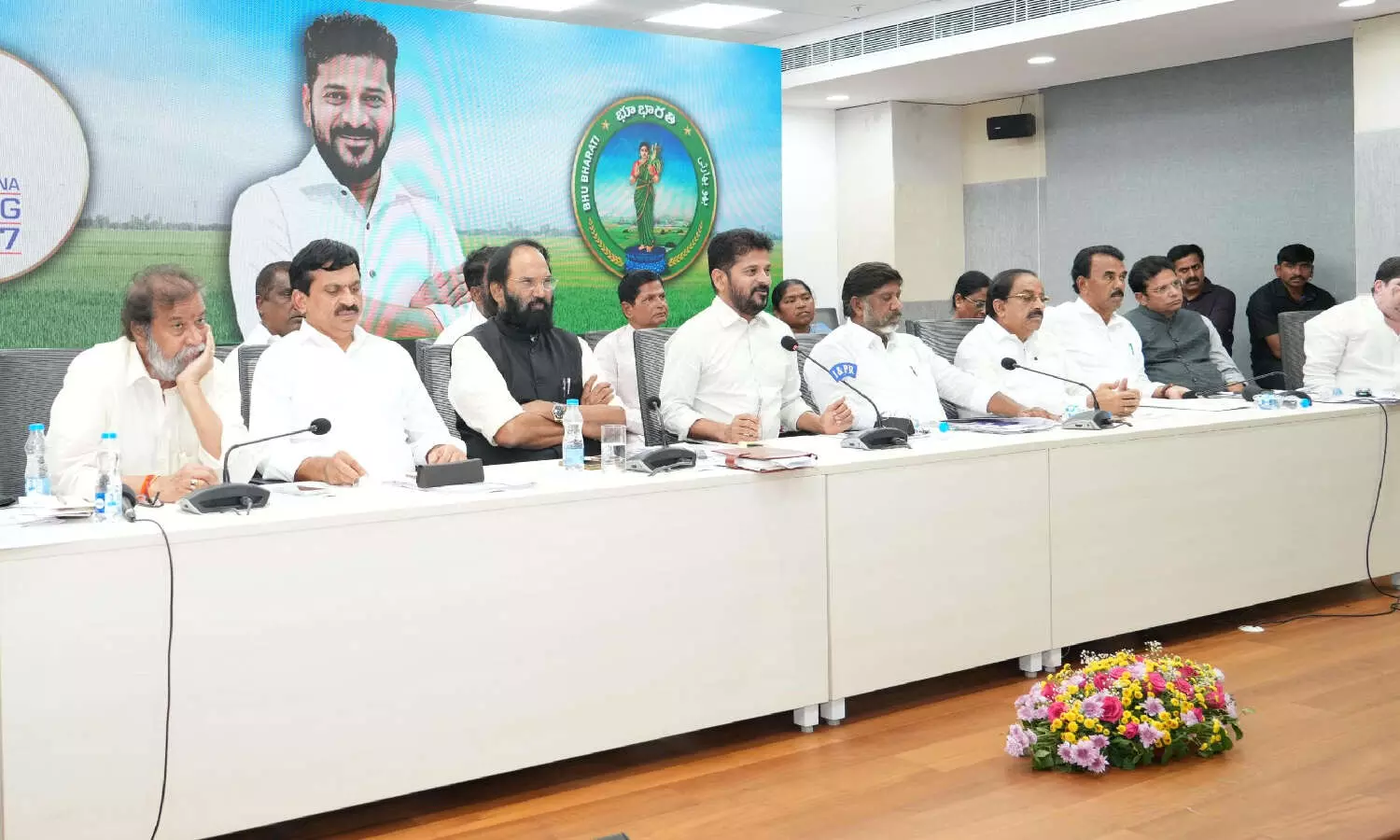Kaleshwaram project: Ghosh report points to unilateral redesign by KCR; Cabinet to debate in Assembly
Telangana Cabinet approves report on ‘irregularities’ in Kaleshwaram project; discussion in Assembly
By Kaniza Garari
Hyderabad: Telangana cabinet approves Justice P C Ghose commission report, to debate in the Assembly
Hyderabad: The Telangana Cabinet approved the Justice PC Ghosh Commission report on the Kaleshwaram Lift Irrigation Project and has decided to present it in the Legislative Assembly and decide the next steps based on the opinions of the House.
The report has recommended strong legal action against those involved and the recovery of misused public funds.
Significant lapses
A judicial commission’s report on the Kaleshwaram Lift Irrigation Project has unveiled significant lapses, directly attributing the project’s failures to a series of procedural violations, design flaws and disregard for expert advice under the previous BRS government. The 665-page report, submitted by the Justice PC Ghosh Commission, was formally approved by the Telangana cabinet, setting the stage for a major political and legal confrontation.
The report, which comes after a 16-month-long investigation, serves as a comprehensive indictment of the decision-making process and execution of what was once hailed as a monumental engineering feat.
Key findings from the commission’s report include:
‘Sole Decision’ making and bypassing Cabinet
The commission’s most crucial finding is that the decision to ‘redesign’ the original Pranahita-Chevella project and construct the Medigadda, Annaram and Sundilla barrages was a ‘sole and individual decision’ of the then chief minister K Chandrashekar Rao.
The report stated that these critical decisions were made without formal Cabinet approval, bypassing established government procedures and protocols. This has been cited as the root cause of the subsequent engineering and financial problems.
Suppression of expert opinions
The report highlighted a deliberate suppression of an expert committee report from January 2015.
This committee had specifically advised against the construction of the Medigadda barrage due to concerns over high costs and potential time delays, recommending alternate sites instead. The commission’s findings suggest that this report was intentionally ignored, and the project proceeded with a clear ‘malicious intention to unduly favour’ certain contractors.
Flawed design, construction and maintenance
The commission’s analysis reveals deep-seated engineering and construction flaws.
The barrages were designed on ‘permeable foundations’ but were utilised as storage structures, a practice that is fundamentally against standard engineering principles. The report notes that crucial technical studies, such as ‘backwater studies, tail water rating curves, and geophysical investigations,’ were not conducted at the shifted barrage locations of Annaram and Sundilla.
The report also pointed to a complete lack of a proper operation and maintenance manual, with the continuous impounding of water identified as a primary reason for the structural distress that led to the collapse.
Financial irregularities and accountability
The Ghosh Commission found that the project’s cost was abnormally escalated to over Rs 1 lakh crore from its original estimate, with the cost being finalised even before the detailed project report was ready.
The commission has directly held former KCR and former Irrigation Minister T Harish Rao responsible for the irregularities from the planning to the operation of the barrages. It also recommended specific actions, including the recovery of over Rs 6 crore from certain officials who were responsible for ignoring expert reports.
Project inflated to Rs 1 lakh crore, says Uttam
Irrigation Minister N Uttam Kumar Reddy, who presented a summary of the report to the cabinet, has been a vocal critic of the previous government’s handling of the project.
He has asserted that the project’s failures are a result of the BRS government’s ‘arrogance and corruption.’
Reddy pointed out that the original Dr BR Ambedkar Pranahita-Chevella project, with an estimated cost of Rs 38,000 crore, was a more viable option. The decision to shift the project to Medigadda and inflate the cost to over Rs 1 lakh crore was, in his words, ‘lured by commissions.’
Reddy has further highlighted the immense financial burden on the state, stating that due to the project’s mismanagement, Telangana now has to repay Rs 16,000 crore every year, a ‘generational burden’ that will last for decades.
He argued that if the original plan had been completed, the remaining funds could have been used to finish other pending irrigation projects, such as Palamuru-Rangareddy, Koilsagar and Devadula, which would have truly benefited the State’s agricultural sector.
Political Fallout
Following the Cabinet’s approval, Chief Minister Revanth Reddy has announced that the report will be tabled in the upcoming Assembly session.
The government plans to seek the opinions of all members before deciding on a course of action. CM Reddy has stated that any measures taken will be based on the commission's recommendations and not on political vendetta. He also preemptively dismissed any potential criticism from the BRS party, noting that it is natural for them to oppose a report that is not in their favour.
No experts consulted
Attending a press meet after the Cabinet Meeting, deputy chief minister Mallu Bhatti Vikramarka said that the Kaleshwaram project, built at a cost of over one lakh crore rupees, has collapsed.
He said that the report was submitted only after the arguments of the previous ministers were taken into account.
“From planning to construction and management, the then Chief Minister’s interventions and directions led to irregularities. The decision to take up three barrages right from the conceptual stage of the Kaleshwaram project was solely that of the then CM,” he said.
He said that the claim by the then Finance Minister, Eatala Rajender, that the Cabinet Sub-Committee’s decision was approved by the Cabinet is incorrect. The Cabinet did not give its approval, and the Commission clarified that he had reported inaccurately to the Commission, he said.
He said that for the modified Annaram and Sundilla barrages, no backwater studies or geophysical investigations were conducted. Without conducting field studies, designs were prepared with inexplicable delays.
He said that according to the retired expert engineers committee, the explanation given that the barrage construction site was shifted is not appropriate.